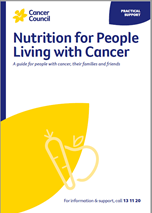- Home
- Pleural mesothelioma
- Managing symptoms
- Constipation
Constipation
Having infrequent or difficult-to-pass bowel movements (also called faeces, stools or poo) is known as constipation. Common causes include not getting enough exercise, eating too little fibre, or not drinking enough fluids. Opioid pain medicines, some anti-nausea drugs and some chemotherapy drugs may also cause constipation.
Severe constipation with abdominal pain, bloating, nausea and vomiting may be signs of a blockage in the bowel (bowel obstruction). This occasionally happens with peritoneal mesothelioma, but rarely with pleural mesothelioma. To relieve the symptoms, you may have a small tube (stent) put in to help keep the bowel open. If the bowel is completely blocked, it needs to be cleared with emergency surgery.
Managing constipation
- Drink plenty of fluids.
- Eat fresh fruit and vegetables and fibre-rich foods (e.g. prunes, apples with skin on), unless your doctor advises otherwise.
- Try to be physically active every day. Talk to your doctor or physiotherapist to find the exercise that is right for you.
- Ask your doctor how to manage constipation. You may be prescribed medicines to help stimulate bowel movements.
- Try over-the-counter laxatives such as Coloxyl with senna, Duphalac or Movicol. Check the dose with the pharmacist and let your doctor know. Don’t wait too long before starting laxatives.
- Talk to your treatment team about how to manage bowel obstruction. If your stomach is swollen and you are in pain, call Triple Zero (000) as it may be an emergency.
→ READ MORE: Managing poor appetite and weight loss
Podcast: Appetite Loss and Nausea
Listen to more episodes from our podcast for people affected by cancer
Video: Exercise and cancer
All updated content has been clinically reviewed by A/Prof Anthony Linton, Medical Oncologist, Concord Cancer Centre and Concord Repatriation General Hospital, NSW; Dr Naveed Alam, Thoracic Surgeon, St Vincent’s Private Hospital Melbourne and Monash Medical Centre, VIC; Prof David Morris, Peritonectomy Surgeon, St George Hospital and UNSW, NSW. This edition is based on the previous edition, which was reviewed by the following panel: A/Prof Anthony Linton (see above); Dr Naveed Alam, (see above); Donatella Arnoldo, Consumer; Polly Baldwin, 13 11 20 Consultant, Cancer Council SA; Dr Melvin (Wee Loong) Chin, Medical Oncologist, Sir Charles Gairdner Hospital and National Centre for Asbestos Related Diseases, WA; Prof Kwun Fong, Thoracic and Sleep Physician and Director, UQ Thoracic Research Centre, The Prince Charles Hospital, and Professor of Medicine, The University of Queensland, QLD; Vicki Hamilton OAM, Consumer and CEO, Asbestos Council of Victoria/ GARDS Inc., VIC; Dr Susan Harden, Radiation Oncologist, Peter MacCallum Cancer Centre, VIC; Penny Jacomos, Social Worker, Asbestos Diseases Society of South Australia, SA; Prof Brian Le, Director, Parkville Integrated Palliative Care Service, The Royal Melbourne Hospital and Peter MacCallum Cancer Centre, VIC; Lung Cancer Support Nurses, Lung Foundation Australia; Jocelyn McLean, Mesothelioma Support Coordinator, Asbestos Diseases Research Institute, NSW; Prof David Morris (see above); Joanne Oates, Registered Occupational Therapist, Expert Witness in Dust Diseases, and Director, Evaluate, NSW; Chris Sheppard and Adam Barlow, RMB Lawyers.
View the Cancer Council NSW editorial policy.
View all publications or call 13 11 20 for free printed copies.
